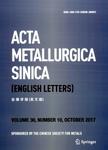EFFECT OF DEEP COLD TREATMENT ON TWO CASE HARDENING STEELS
EFFECT OF DEEP COLD TREATMENT ON TWO CASE HARDENING STEELS作者机构:V-Research Center of Competence for Tribology and Technical Logistics GmbHDornbirnAustriap The Linde GroupUnterschleiβheimGermany Lingenhle Technology GmbHFeldkirchAustria
出 版 物:《Acta Metallurgica Sinica(English Letters)》 (金属学报(英文版))
年 卷 期:2008年第21卷第1期
页 面:1-7页
核心收录:
学科分类:080503[工学-材料加工工程] 08[工学] 0805[工学-材料科学与工程(可授工学、理学学位)] 0802[工学-机械工程] 080201[工学-机械制造及其自动化]
基 金:Acknowledgements-This research project was funded by the Austrian Kind-pmgmm and the results were obtained at the Kplus-center of materiakr Leoben MCL and at the Kind-centre of competence V-Research. The authors are also grateful to Lingenhiile Technologie GMbH in Feldkirch Awtri5 and Linde Gas Corp. in Munach Gennany for setting up and supporting the research project
主 题:Carburised steel Deep cold Retained austenite
摘 要:Although cold treatments have been used to reduce the retained austenite in the cases of carburised steel for many years, there is little data on deep cold temperatures below -70℃ or treatment times longer than an hour or two. This study set out to determine the effects of such deep cold treatments at temperatures -150℃ for 24 h. The study investigated the effects of deep cold on the microstructure, hardness profile, residual stress and internal oxidation on two typical carburising steels, 16MnCr5 and 21NiCrMo2. The study found that for both 16MnCr5 and 21NiCrMo2 carburised to a case depth of approximately 0.8 mm, the longer and colder the deep cold treatment, the more the austenite retained in the case was converted to martensite and the harder it became. After low temperature tempering, the hardness difference was smaller, but still significant. In both steels, the case appeared more refined and homogeneous after deep cold treatment. Deep cold treatment had a negligible effect on the core properties of either steel.



